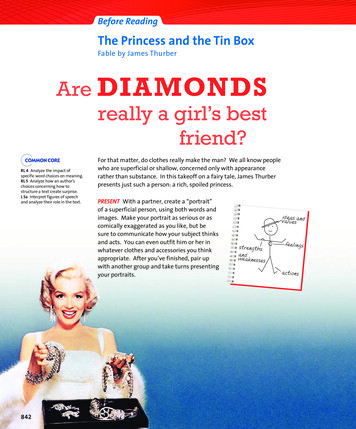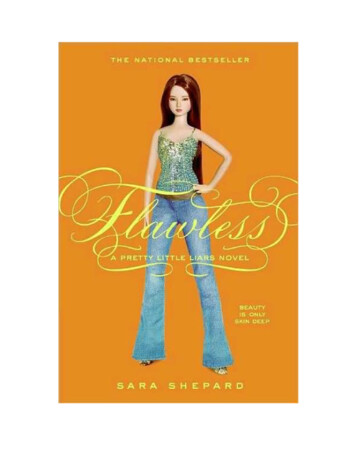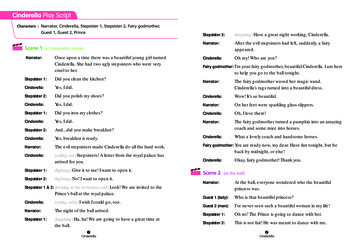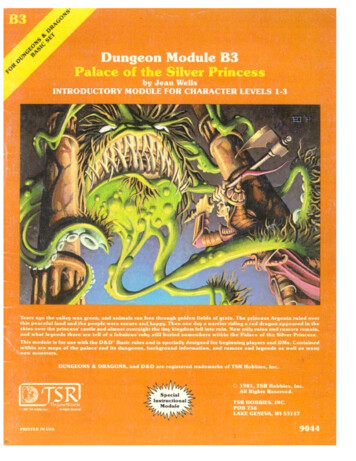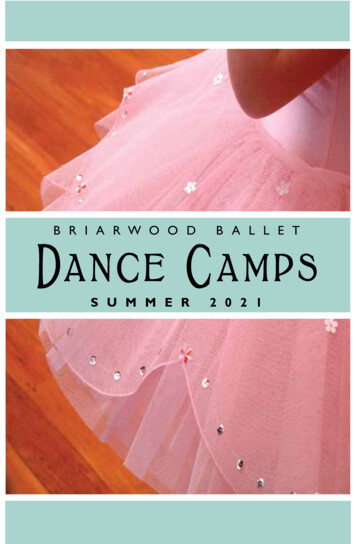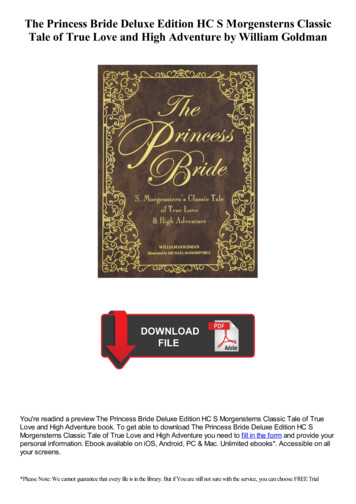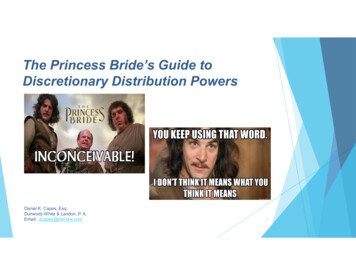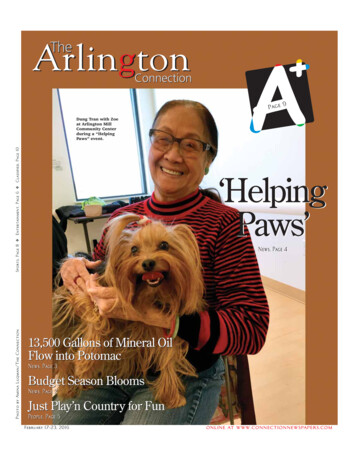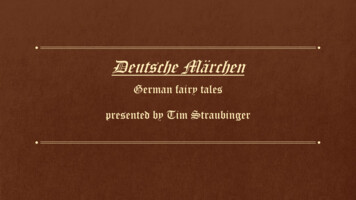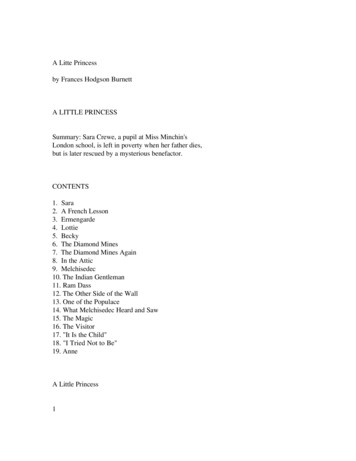
Transcription
A Litte Princessby Frances Hodgson BurnettA LITTLE PRINCESSSummary: Sara Crewe, a pupil at Miss Minchin'sLondon school, is left in poverty when her father dies,but is later rescued by a mysterious benefactor.CONTENTS1. Sara2. A French Lesson3. Ermengarde4. Lottie5. Becky6. The Diamond Mines7. The Diamond Mines Again8. In the Attic9. Melchisedec10. The Indian Gentleman11. Ram Dass12. The Other Side of the Wall13. One of the Populace14. What Melchisedec Heard and Saw15. The Magic16. The Visitor17. "It Is the Child"18. "I Tried Not to Be"19. AnneA Little Princess1
SaraOnce on a dark winter's day, when the yellow fog hung so thickand heavy in the streets of London that the lamps were lightedand the shop windows blazed with gas as they do at night, anodd-looking little girl sat in a cab with her father and wasdriven rather slowly through the big thoroughfares.She sat with her feet tucked under her, and leaned against her father,who held her in his arm, as she stared out of the window at the passingpeople with a queer old-fashioned thoughtfulness in her big eyes.She was such a little girl that one did not expect to see such a lookon her small face. It would have been an old look for a childof twelve, and Sara Crewe was only seven. The fact was, however,that she was always dreaming and thinking odd things and couldnot herself remember any time when she had not been thinkingthings about grown-up people and the world they belonged to.She felt as if she had lived a long, long time.At this moment she was remembering the voyage she had just madefrom Bombay with her father, Captain Crewe. She was thinkingof the big ship, of the Lascars passing silently to and fro on it,of the children playing about on the hot deck, and of someyoung officers' wives who used to try to make her talk to themand laugh at the things she said.Principally, she was thinking of what a queer thing it wasthat at one time one was in India in the blazing sun, and thenin the middle of the ocean, and then driving in a strange vehiclethrough strange streets where the day was as dark as the night.She found this so puzzling that she moved closer to her father."Papa," she said in a low, mysterious little voice which was almosta whisper, "papa.""What is it, darling?" Captain Crewe answered, holding her closerand looking down into her face. "What is Sara thinking of?""Is this the place?" Sara whispered, cuddling still closer to him."Is it, papa?""Yes, little Sara, it is. We have reached it at last." And though
she was only seven years old, she knew that he felt sad when hesaid it.It seemed to her many years since he had begun to prepare hermind for "the place," as she always called it. Her mother haddied when she was born, so she had never known or missed her.Her young, handsome, rich, petting father seemed to be the onlyrelation she had in the world. They had always played togetherand been fond of each other. She only knew he was rich because shehad heard people say so when they thought she was not listening,and she had also heard them say that when she grew up she wouldbe rich, too. She did not know all that being rich meant. She hadalways lived in a beautiful bungalow, and had been used to seeingmany servants who made salaams to her and called her "Missee Sahib,"and gave her her own way in everything. She had had toys and petsand an ayah who worshipped her, and she had gradually learned thatpeople who were rich had these things. That, however, was all sheknew about it.During her short life only one thing had troubled her, and thatthing was "the place" she was to be taken to some day. The climateof India was very bad for children, and as soon as possible theywere sent away from it--generally to England and to school.She had seen other children go away, and had heard their fathersand mothers talk about the letters they received from them.She had known that she would be obliged to go also, and thoughsometimes her father's stories of the voyage and the new countryhad attracted her, she had been troubled by the thought that hecould not stay with her."Couldn't you go to that place with me, papa?" she had askedwhen she was five years old. "Couldn't you go to school, too?I would help you with your lessons.""But you will not have to stay for a very long time, little Sara,"he had always said. "You will go to a nice house where there will bea lot of little girls, and you will play together, and I will sendyou plenty of books, and you will grow so fast that it will seemscarcely a year before you are big enough and clever enough to comeback and take care of papa."She had liked to think of that. To keep the house for her father;to ride with him, and sit at the head of his table when he haddinner parties; to talk to him and read his books--that would bewhat she would like most in the world, and if one must go away to
"the place" in England to attain it, she must make up her mind to go.She did not care very much for other little girls, but if shehad plenty of books she could console herself. She liked booksmore than anything else, and was, in fact, always inventing storiesof beautiful things and telling them to herself. Sometimes shehad told them to her father, and he had liked them as much as she did."Well, papa," she said softly, "if we are here I suppose we mustbe resigned."He laughed at her old-fashioned speech and kissed her. He was reallynot at all resigned himself, though he knew he must keep that a secret.His quaint little Sara had been a great companion to him, and hefelt he should be a lonely fellow when, on his return to India,he went into his bungalow knowing he need not expect to see thesmall figure in its white frock come forward to meet him. So heheld her very closely in his arms as the cab rolled into the big,dull square in which stood the house which was their destination.It was a big, dull, brick house, exactly like all the othersin its row, but that on the front door there shone a brass plateon which was engraved in black letters:MISS MINCHIN,Select Seminary for Young Ladies."Here we are, Sara," said Captain Crewe, making his voice soundas cheerful as possible. Then he lifted her out of the caband they mounted the steps and rang the bell. Sara often thoughtafterward that the house was somehow exactly like Miss Minchin.It was respectable and well furnished, but everything in it was ugly;and the very armchairs seemed to have hard bones in them. In the halleverything was hard and polished--even the red cheeks of the moonface on the tall clock in the corner had a severe varnished look.The drawing room into which they were ushered was covered by a carpetwith a square pattern upon it, the chairs were square, and a heavymarble timepiece stood upon the heavy marble mantel.As she sat down in one of the stiff mahogany chairs, Sara castone of her quick looks about her."I don't like it, papa," she said. "But then I dare say soldiers-even brave ones--don't really LIKE going into bat{tle}."
Captain Crewe laughed outright at this. He was young and full of fun,and he never tired of hearing Sara's queer speeches."Oh, little Sara," he said. "What shall I do when I have no oneto say solemn things to me? No one else is as solemn as you are.""But why do solemn things make you laugh so?" inquired Sara."Because you are such fun when you say them," he answered,laughing still more. And then suddenly he swept her into his armsand kissed her very hard, stopping laughing all at once and lookingalmost as if tears had come into his eyes.It was just then that Miss Minchin entered the room. She was verylike her house, Sara felt: tall and dull, and respectable and ugly.She had large, cold, fishy eyes, and a large, cold, fishy smile.It spread itself into a very large smile when she saw Sara andCaptain Crewe. She had heard a great many desirable things of theyoung soldier from the lady who had recommended her school to him.Among other things, she had heard that he was a rich father who waswilling to spend a great deal of money on his little daughter."It will be a great privilege to have charge of such a beautifuland promising child, Captain Crewe," she said, taking Sara's hand andstroking it. "Lady Meredith has told me of her unusual cleverness.A clever child is a great treasure in an establishment like mine."Sara stood quietly, with her eyes fixed upon Miss Minchin's face.She was thinking something odd, as usual."Why does she say I am a beautiful child?" she was thinking."I am not beautiful at all. Colonel Grange's little girl, Isobel,is beautiful. She has dimples and rose-colored cheeks, and longhair the color of gold. I have short black hair and green eyes;besides which, I am a thin child and not fair in the least. I amone of the ugliest children I ever saw. She is beginning by tellinga story."She was mistaken, however, in thinking she was an ugly child.She was not in the least like Isobel Grange, who had been the beautyof the regiment, but she had an odd charm of her own. She was a slim,supple creature, rather tall for her age, and had an intense,attractive little face. Her hair was heavy and quite black andonly curled at the tips; her eyes were greenish gray, it is true,
but they were big, wonderful eyes with long, black lashes, and thoughshe herself did not like the color of them, many other people did.Still she was very firm in her belief that she was an ugly little girl,and she was not at all elated by Miss Minchin's flattery."I should be telling a story if I said she was beautiful," she thought;"and I should know I was telling a story. I believe I am as uglyas she is--in my way. What did she say that for?"After she had known Miss Minchin longer she learned why she hadsaid it. She discovered that she said the same thing to each papaand mamma who brought a child to her school.Sara stood near her father and listened while he and MissMinchin talked. She had been brought to the seminary because LadyMeredith's two little girls had been educated there, and CaptainCrewe had a great respect for Lady Meredith's experience.Sara was to be what was known as "a parlor boarder," and she wasto enjoy even greater privileges than parlor boarders usually did.She was to have a pretty bedroom and sitting room of her own;she was to have a pony and a carriage, and a maid to take the placeof the ayah who had been her nurse in India."I am not in the least anxious about her education," Captain Crewesaid, with his gay laugh, as he held Sara's hand and patted it."The difficulty will be to keep her from learning too fast andtoo much. She is always sitting with her little nose burrowinginto books. She doesn't read them, Miss Minchin; she gobblesthem up as if she were a little wolf instead of a little girl.She is always starving for new books to gobble, and she wantsgrown-up books--great, big, fat ones--French and German as wellas English--history and biography and poets, and all sortsof things. Drag her away from her books when she reads too much.Make her ride her pony in the Row or go out and buy a new doll.She ought to play more with dolls.""Papa," said Sara, "you see, if I went out and bought a new doll everyfew days I should have more than I could be fond of. Dolls oughtto be intimate friends. Emily is going to be my intimate friend."Captain Crewe looked at Miss Minchin and Miss Minchin lookedat Captain Crewe."Who is Emily?" she inquired.
"Tell her, Sara," Captain Crewe said, smiling.Sara's green-gray eyes looked very solemn and quite soft as she answered."She is a doll I haven't got yet," she said. "She is a doll papais going to buy for me. We are going out together to find her.I have called her Emily. She is going to be my friend when papais gone. I want her to talk to about him."Miss Minchin's large, fishy smile became very flattering indeed."What an original child!" she said. "What a darling little creature!""Yes," said Captain Crewe, drawing Sara close. "She is a darlinglittle creature. Take great care of her for me, Miss Minchin."Sara stayed with her father at his hotel for several days; in fact,she remained with him until he sailed away again to India. They wentout and visited many big shops together, and bought a great many things.They bought, indeed, a great many more things than Sara needed;but Captain Crewe was a rash, innocent young man and wanted his littlegirl to have everything she admired and everything he admired himself,so between them they collected a wardrobe much too grand for a childof seven. There were velvet dresses trimmed with costly furs,and lace dresses, and embroidered ones, and hats with great,soft ostrich feathers, and ermine coats and muffs, and boxes oftiny gloves and handkerchiefs and silk stockings in such abundantsupplies that the polite young women behind the counters whisperedto each other that the odd little girl with the big, solemn eyesmust be at least some foreign princess--perhaps the little daughterof an Indian rajah.And at last they found Emily, but they went to a number of toyshops and looked at a great many dolls before they discovered her."I want her to look as if she wasn't a doll really," Sara said."I want her to look as if she LISTENS when I talk to her.The trouble with dolls, papa"--and she put her head on one sideand reflected as she said it--"the trouble with dolls is that theynever seem to HEAR ." So they looked at big ones and little ones-at dolls with black eyes and dolls with blue--at dolls with brown curlsand dolls with golden braids, dolls dressed and dolls undressed."You see," Sara said when they were examining one who had no clothes."If, when I find her, she has no frocks, we can take her to a
dressmaker and have her things made to fit. They will fit betterif they are tried on."After a number of disappointments they decided to walk and lookin at the shop windows and let the cab follow them. They hadpassed two or three places without even going in, when, as theywere approaching a shop which was really not a very large one,Sara suddenly started and clutched her father's arm."Oh, papa!" she cried. "There is Emily!"A flush had risen to her face and there was an expressionin her green-gray eyes as if she had just recognized someoneshe was intimate with and fond of."She is actually waiting there for us!" she said. "Let us goin to her.""Dear me," said Captain Crewe, "I feel as if we ought to havesomeone to introduce us.""You must introduce me and I will introduce you," said Sara."But I knew her the minute I saw her--so perhaps she knew me, too."Perhaps she had known her. She had certainly a very intelligentexpression in her eyes when Sara took her in her arms.She was a large doll, but not too large to carry about easily;she had naturally curling golden-brown hair, which hung like a mantleabout her, and her eyes were a deep, clear, gray-blue, with soft,thick eyelashes which were real eyelashes and not mere painted lines."Of course," said Sara, looking into her face as she held her onher knee, "of course papa, this is Emily."So Emily was bought and actually taken to a children's outfitter'sshop and measured for a wardrobe as grand as Sara's own.She had lace frocks, too, and velvet and muslin ones, and hatsand coats and beautiful lace-trimmed underclothes, and glovesand handkerchiefs and furs."I should like her always to look as if she was a child with agood mother," said Sara. "I'm her mother, though I am goingto make a companion of her."Captain Crewe would really have enjoyed the shopping tremendously,
but that a sad thought kept tugging at his heart. This all meant thathe was going to be separated from his beloved, quaint little comrade.He got out of his bed in the middle of that night and went and stoodlooking down at Sara, who lay asleep with Emily in her arms.Her black hair was spread out on the pillow and Emily's golden-brownhair mingled with it, both of them had lace-ruffled nightgowns,and both had long eyelashes which lay and curled up on their cheeks.Emily looked so like a real child that Captain Crewe felt gladshe was there. He drew a big sigh and pulled his mustache with aboyish expression."Heigh-ho, little Sara!" he said to himself "I don't believe youknow how much your daddy will miss you."The next day he took her to Miss Minchin's and left her there.He was to sail away the next morning. He explained to Miss Minchinthat his solicitors, Messrs. Barrow & Skipworth, had charge ofhis affairs in England and would give her any advice she wanted,and that they would pay the bills she sent in for Sara's expenses.He would write to Sara twice a week, and she was to be given everypleasure she asked for."She is a sensible little thing, and she never wants anything itisn't safe to give her," he said.Then he went with Sara into her little sitting room and they badeeach other good-by. Sara sat on his knee and held the lapels of hiscoat in her small hands, and looked long and hard at his face."Are you learning me by heart, little Sara?" he said, stroking her hair."No," she answered. "I know you by heart. You are inside my heart."And they put their arms round each other and kissed as if they wouldnever let each other go.When the cab drove away from the door, Sara was sitting on thefloor of her sitting room, with her hands under her chin and hereyes following it until it had turned the corner of the square.Emily was sitting by her, and she looked after it, too. When MissMinchin sent her sister, Miss Amelia, to see what the child was doing,she found she could not open the door."I have locked it," said a queer, polite little voice from inside."I want to be quite by myself, if you please."
Miss Amelia was fat and dumpy, and stood very much in awe ofher sister. She was really the better-natured person of the two,but she never disobeyed Miss Minchin. She went downstairs again,looking almost alarmed."I never saw such a funny, old-fashioned child, sister," she said."She has locked herself in, and she is not making the least particleof noise.""It is much better than if she kicked and screamed, as someof them do," Miss Minchin answered. "I expected that a childas much spoiled as she is would set the whole house in an uproar.If ever a child was given her own way in everything, she is.""I've been opening her trunks and putting her things away,"said Miss Amelia. "I never saw anything like them--sable and ermineon her coats, and real Valenciennes lace on her underclothing.You have seen some of her clothes. What DO you think of them?""I think they are perfectly ridiculous," replied Miss Minchin,sharply; "but they will look very well at the head of theline when we take the schoolchildren to church on Sunday.She has been provided for as if she were a little princess."And upstairs in the locked room Sara and Emily sat on the floorand stared at the corner round which the cab had disappeared,while Captain Crewe looked backward, waving and kissing his handas if he could not bear to stop.2A French LessonWhen Sara entered the schoolroom the next morning everybody lookedat her with wide, interested eyes. By that time every pupil-from Lavinia Herbert, who was nearly thirteen and felt quite grown up,to Lottie Legh, who was only just four and the baby of the school-had heard a great deal about her. They knew very certainly thatshe was Miss Minchin's show pupil and was considered a creditto the establishment. One or two of them had even caught a glimpseof her French maid, Mariette, who had arrived the evening before.
Lavinia had managed to pass Sara's room when the door was open,and had seen Mariette opening a box which had arrived late fromsome shop."It was full of petticoats with lace frills on them--frills and frills,"she whispered to her friend Jessie as she bent over her geography."I saw her shaking them out. I heard Miss Minchin say to MissAmelia that her clothes were so grand that they were ridiculousfor a child. My mamma says that children should be dressed simply.She has got one of those petticoats on now. I saw it when shesat down.""She has silk stockings on!" whispered Jessie, bending over hergeography also. "And what little feet! I never saw such little feet.""Oh," sniffed Lavinia, spitefully, "that is the way her slippersare made. My mamma says that even big feet can be made to look smallif you have a clever shoemaker. I don't think she is pretty at all.Her eyes are such a queer color.""She isn't pretty as other pretty people are," said Jessie,stealing a glance across the room; "but she makes you want to lookat her again. She has tremendously long eyelashes, but her eyesare almost green."Sara was sitting quietly in her seat, waiting to be told what to do.She had been placed near Miss Minchin's desk. She was not abashedat all by the many pairs of eyes watching her. She was interestedand looked back quietly at the children who looked at her.She wondered what they were thinking of, and if they liked Miss Minchin,and if they cared for their lessons, and if any of them had a papaat all like her own. She had had a long talk with Emily about herpapa that morning."He is on the sea now, Emily," she had said. "We must be very greatfriends to each other and tell each other things. Emily, look at me.You have the nicest eyes I ever saw--but I wish you could speak."She was a child full of imaginings and whimsical thoughts, and oneof her fancies was that there would be a great deal of comfort in evenpretending that Emily was alive and really heard and understood.After Mariette had dressed her in her dark-blue schoolroom frockand tied her hair with a dark-blue ribbon, she went to Emily,who sat in a chair of her own, and gave her a book.
"You can read that while I am downstairs," she said; and, seeing Mariettelooking at her curiously, she spoke to her with a serious little face."What I believe about dolls," she said, "is that they can do thingsthey will not let us know about. Perhaps, really, Emily can readand talk and walk, but she will only do it when people are outof the room. That is her secret. You see, if people knew thatdolls could do things, they would make them work. So, perhaps,they have promised each other to keep it a secret. If you stayin the room, Emily will just sit there and stare; but if you go out,she will begin to read, perhaps, or go and look out of the window.Then if she heard either of us coming, she would just run backand jump into her chair and pretend she had been there all the time.""Comme elle est drole!" Mariette said to herself, and when she wentdownstairs she told the head housemaid about it. But she had alreadybegun to like this odd little girl who had such an intelligent smallface and such perfect manners. She had taken care of childrenbefore who were not so polite. Sara was a very fine little person,and had a gentle, appreciative way of saying, "If you please, Mariette,""Thank you, Mariette," which was very charming. Mariette toldthe head housemaid that she thanked her as if she was thanking a lady."Elle a l'air d'une princesse, cette petite," she said.Indeed, she was very much pleased with her new little mistressand liked her place greatly.After Sara had sat in her seat in the schoolroom for a few minutes,being looked at by the pupils, Miss Minchin rapped in a dignifiedmanner upon her desk."Young ladies," she said, "I wish to introduce you to yournew companion." All the little girls rose in their places, and Sararose also. "I shall expect you all to be very agreeable to Miss Crewe;she has just come to us from a great distance--in fact, from India.As soon as lessons are over you must make each other's acquaintance."The pupils bowed ceremoniously, and Sara made a little curtsy,and then they sat down and looked at each other again."Sara," said Miss Minchin in her schoolroom manner, "come here to me."She had taken a book from the desk and was turning over its leaves.Sara went to her politely.
"As your papa has engaged a French maid for you," she began, "I concludethat he wishes you to make a special study of the French language."Sara felt a little awkward."I think he engaged her," she said, "because he--he thought I wouldlike her, Miss Minchin.""I am afraid," said Miss Minchin, with a slightly sour smile,"that you have been a very spoiled little girl and always imaginethat things are done because you like them. My impression isthat your papa wished you to learn French."If Sara had been older or less punctilious about being quite politeto people, she could have explained herself in a very few words.But, as it was, she felt a flush rising on her cheeks. Miss Minchinwas a very severe and imposing person, and she seemed so absolutelysure that Sara knew nothing whatever of French that she felt as if itwould be almost rude to correct her. The truth was that Sara couldnot remember the time when she had not seemed to know French.Her father had often spoken it to her when she had been a baby.Her mother had been a French woman, and Captain Crewe had lovedher language, so it happened that Sara had always heard and beenfamiliar with it."I--I have never really learned French, but--but--" she began,trying shyly to make herself clear.One of Miss Minchin's chief secret annoyances was that she did notspeak French herself, and was desirous of concealing the irritating fact.She, therefore, had no intention of discussing the matter and layingherself open to innocent questioning by a new little pupil."That is enough," she said with polite tartness. "If youhave not learned, you must begin at once. The French master,Monsieur Dufarge, will be here in a few minutes. Take thisbook and look at it until he arrives."Sara's cheeks felt warm. She went back to her seat and opened the book.She looked at the first page with a grave face. She knew it wouldbe rude to smile, and she was very determined not to be rude.But it was very odd to find herself expected to study a pagewhich told her that "le pere" meant "the father," and "la mere"meant "the mother."
Miss Minchin glanced toward her scrutinizingly."You look rather cross, Sara," she said. "I am sorry you do notlike the idea of learning French.""I am very fond of it," answered Sara, thinking she would tryagain; "but--""You must not say but' when you are told to do things,"said Miss Minchin. "Look at your book again."And Sara did so, and did not smile, even when she found that "le fils"meant "the son," and "le frere" meant "the brother.""When Monsieur Dufarge comes," she thought, "I can make him understand."Monsieur Dufarge arrived very shortly afterward. He was a very nice,intelligent, middle-aged Frenchman, and he looked interested whenhis eyes fell upon Sara trying politely to seem absorbed in herlittle book of phrases."Is this a new pupil for me, madame?" he said to Miss Minchin."I hope that is my good fortune.""Her papa--Captain Crewe--is very anxious that she should beginthe language. But I am afraid she has a childish prejudice against it.She does not seem to wish to learn," said Miss Minchin."I am sorry of that, mademoiselle," he said kindly to Sara."Perhaps, when we begin to study together, I may show you that itis a charming tongue."Little Sara rose in her seat. She was beginning to feelrather desperate, as if she were almost in disgrace. She lookedup into Monsieur Dufarge's face with her big, green-gray eyes,and they were quite innocently appealing. She knew that he wouldunderstand as soon as she spoke. She began to explain quitesimply in pretty and fluent French. Madame had not understood.She had not learned French exactly--not out of books--but herpapa and other people had always spoken it to her, and she hadread it and written it as she had read and written English.Her papa loved it, and she loved it because he did. Her dear mamma,who had died when she was born, had been French. She would be gladto learn anything monsieur would teach her, but what she had triedto explain to madame was that she already knew the words in this book--
and she held out the little book of phrases.When she began to speak Miss Minchin started quite violentlyand sat staring at her over her eyeglasses, almost indignantly,until she had finished. Monsieur Dufarge began to smile, and hissmile was one of great pleasure. To hear this pretty childish voicespeaking his own language so simply and charmingly made him feelalmost as if he were in his native land--which in dark, foggy daysin London sometimes seemed worlds away. When she had finished,he took the phrase book from her, with a look almost affectionate.But he spoke to Miss Minchin."Ah, madame," he said, "there is not much I can teach her. She hasnot LEARNED French; she is French. Her accent is exquisite.""You ought to have told me," exclaimed Miss Minchin, much mortified,turning to Sara."I--I tried," said Sara. "I--I suppose I did not begin right."Miss Minchin knew she had tried, and that it had not been herfault that she was not allowed to explain. And when she sawthat the pupils had been listening and that Lavinia and Jessiewere giggling behind their French grammars, she felt infuriated."Silence, young ladies!" she said severely, rapping upon the desk."Silence at once!"And she began from that minute to feel rather a grudge againsther show pupil.3ErmengardeOn that first morning, when Sara sat at Miss Minchin's side,aware that the whole schoolroom was devoting itself to observing her,she had noticed very soon one little girl, about her own age,who looked at her very hard with a pair of light, rather dull,blue eyes. She was a fat child who did not look as if she werein the least clever, but she had a good-naturedly pouting mouth.Her flaxen hair was braided in a tight pigtail, tied with a ribbon,
and she had pulled this pigtail around her neck, and was bitingthe end of the ribbon, resting her elbows on the desk, as she staredwonderingly at the new pupil. When Monsieur Dufarge began to speakto Sara, she looked a little frightened; and when Sara steppedforward and, looking at him with the innocent, appealing eyes,answered him, without any warn
Ram Dass 12. The Other Side of the Wall 13. One of the Populace 14. What Melchisedec Heard and Saw 15. The Magic 16. The Visitor 17. "It Is the Child" 18. "I Tried Not to Be" 19. Anne A Little Princess 1. Sara Once

